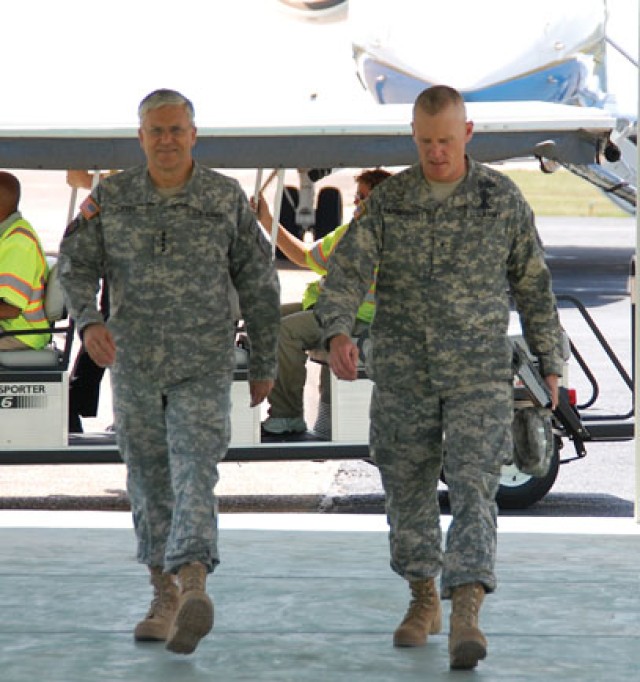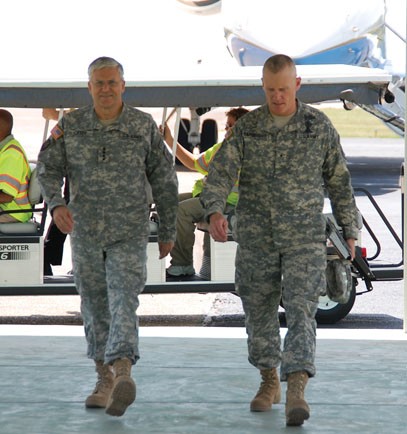Army Chief of Staff Gen. George W. Casey Jr. visited the Joint Readiness Training Center and Fort Polk April 14-15, meeting with both the JRTC and 4th Brigade Combat Team, 10th Mountain Division leadership. Casey said he was impressed with the work done by Brig. Gen. James Yarbrough, commanding general of the JRTC and Fort Polk, and his staff, as well as the Soldiers of the 4th BCT.
"I was primarily interested in how they're doing and what the impacts of repeated deployments are on the Soldiers and Families. If you want to get a real sense of how things are going in a unit, you need to talk to Soldiers 90-120 days after they return from a deployment," Casey said.
"I was very impressed with what I saw." (4-10 Soldiers returned from a 14-month deployment in December and January).
Casey addressed several issues important to Soldiers and their Families.
"We're doing a range of things for troops and their Families," he said. "Two years ago, my wife and I went around the Army and visited leaders, Soldiers and their Families all over the world."
Casey said much has been done for Families over the past two years, yet there is still more to do.
"We saw we still weren't doing enough," he said. "If we were going to hold this force together, we needed to do more for Families. In 2007, we put out the Army Family Covenant and doubled the amount of money spent on Soldier and Family programs: $1.4 billion in 2008, 1.7 billion in 2009 and we'll continue that in 2010."
Casey said he also considered the future.
"The most important thing we can do to help our Soldiers and Families get back in balance is increase the amount of time they spend at home between deployments," he said. "We do that two ways - increase the supply (size of the Army) or decrease the demand. Right now we're doing both. We met the growth targets, established in 2007, in January of this year. We were tasked to meet them by 2012 - so we're three years ahead of schedule. That will have a positive impact."
As for decreasing the demand, Casey pointed to President Barack Obama's plan to draw down the number of troops in Iraq.
"When that is executed, we'll get better dwell rates in 2010 and 2011 than I originally expected," he said. "If the draw down proceeds as planned, we'll get almost 2 A,A1/2 years of dwell time between deployments. That's about where we need to be."
Casey said work is underway to not only increase the time between deployments, but also cut their length.
"We know 12 and 15 months is too long to sustain repeatedly, and we know that six months is too short for the operational environment," he said. "Once we get demand down to about 10 brigade combat teams, we're looking at nine-month deployments. That's nine months out, 24-27 months back. We think that is much more sustainable. We're not going to get there, I don't think, in the next two years, but shortly after that I think we'll be able to do it."
Casey also spoke about the Army's attempt to quell the rise of suicides.
"As you know, the suicide rate last year and the start of this year is the highest since we started keeping data," he said. "The underlying causes are the pressures put on Soldiers by repeated deployments. By this summer, the Army will have developed a Comprehensive Soldier Fitness program, designed to prevent suicides," Casey said.
"A lot of people think everyone who goes to combat gets post traumatic stress, but it's just not true," he said. "The fact is the majority of people come back from combat with a growth experience by confronting something very, very difficult. Our goal is have more Soldiers have that growth experience."
Families are important to Army leadership and Casey said the service has maintained its promises made in the Army Family Covenant.
"We made a pact with Families to fund existing Family programs, provide better access to quality health care, provide quality housing, create better child care and support for youth services and better educational activities for spouses," he said. "We will deliver on all of these."
Casey said the military, even with a war in progress, is an attractive job alternative given today's economic troubles.
"With the turn in economy, we are actually meeting all of our recruitment. That's a positive thing. But I think most importantly, people should know last year 290,000 men and women either enlisted or reenlisted in the Army, Army Guard or Army Reserve, and did so knowing that the country was at war, because they are committed to something bigger than themselves."
Before leaving, Casey thanked the local community for its support to the Soldiers and Families at Fort Polk.
"I'd like to express my personal appreciation at how the community supports our Soldiers at Fort Polk," he said. "We couldn't sustain the Army, which is the best army in the world, without the support we get from communities like Leesville."


Social Sharing